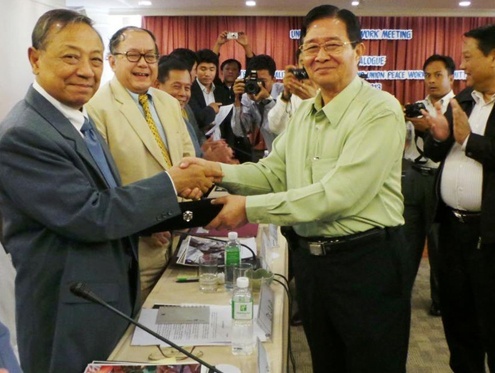Ethnic minority leaders locked horns this week about whether mediators should be used to help negotiate a nation-wide ceasefire deal, as President Thein Sein reiterated his commitment to end decades of civil conflict in Burma.
An umbrella group for armed ethnic groups, the United Nationalities Federal Council (UNFC), told DVB it would be “impractical” to exclude mediators from the process. “Given that there is no confidence between the parties, it would be hard to build mutual trust without mediators,” said Nai Hongsa, secretary of the UNFC.
It follows news that two leading rebel factions, the Karen National Union (KNU) and the Shan State Army – South (SSA-S) described the peace process as too “complicated” for a mediator to resolve, in a joint statement published on Wednesday.
“The dialogue should [be] held only by the parties directly concerned such as the government, parliament, ethnic armed groups, political parties, women and the people. But we wouldn’t want to have the discussions with mediators,” SSA-S spokesperson Sai Lao Hseng told DVB.
“Also, there is a question; who will be the mediator? Daw Aung San Suu Kyi is just a representative in the parliament and for foreign organisations; the circumstances don’t allow them to take up the role. So we should discuss directly [with the government.]”
The joint statement, which affirms each ethnic group’s right to negotiate individually with Naypyidaw, has been seen as an attack on discussions held between the UNFC and a government peace team last weekend. The UNFC – which is made up of 12 armed groups, including the KNU, but excluding the SSA-S – had discussed ways to use mediators in the ceasefire process.
Reportedly KNU joint-secretary-2, Mahn Mahn, who attended the UNFC meeting, also backed plans to include peace mediators. A report in Burma News International said Mahn Mahn’s prominent role in the UNFC has “embarrassed” the new KNU leadership, which was elected last year and has developed an increasingly conciliatory relationship with the central government.
The UNFC’s relationship with individual ethnic groups has also become more strained in recent months, culminating in them boycotting a multi-ethnic peace working group last month. The UNFC has repeatedly called for ethnic groups to present a united front, while many rebel factions have opted for individual negotiations with the government. Critics have accused the government of attempting to divide Burma’s armed ethnic groups.
The chairman of the government-backed Myanmar Peace Center told DVB that Naypyidaw had no plans to use mediators for a nation-wide ceasefire deal.
“I don’t see any need for mediators at this point,” Min Zaw Oo told DVB. “Usually you need a mediator when you have a situation when both parties can’t even talk to each other.”
He added that nationwide peace talks would be held as soon as a ceasefire between the Kachin Independence Organisation (KIO) and the government was “officially endorsed”. The KIO is the only major ethnic armed group yet to sign a formal peace deal with the government. In May, the two sides held a historic meeting in Myitkyina, where they etched out plans to reduce fighting.
But the KIO has insisted that genuine political dialogue, which addresses ethnic grievances and their right to self-determination, must precede a ceasefire. They have also persistently called for the inclusion of international mediators to oversee the peace process, despite rejecting a plea by democracy icon Suu Kyi to help mediate.
Nonetheless, Min Zaw Oo said that a formal agreement is not far off.
“Even in Kachin state there has been no major armed conflict since the start of this year – maybe some small clashes — so what we are observing right now is a quasi-ceasefire,” he said.
Burma has been ravaged by ethnic conflicts since independence in 1948. Since the end of military rule in 2011, Thein Sein has negotiated ceasefire deals with ten out of eleven major ethnic armed groups.
-Additional reporting by Hanna Hindstrom
This story was updated on 23 July 2013.



